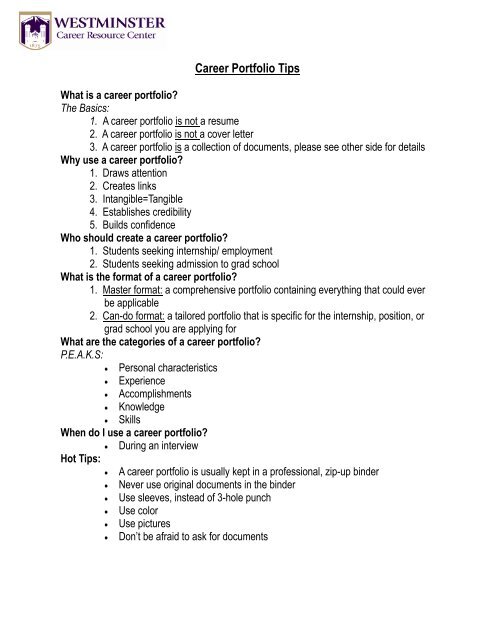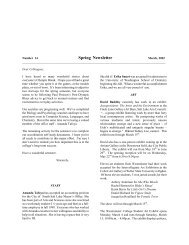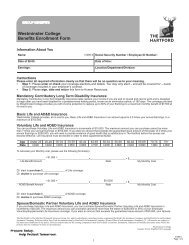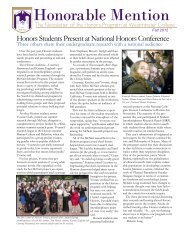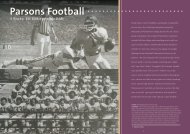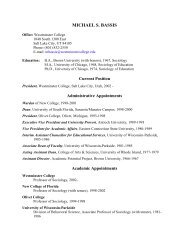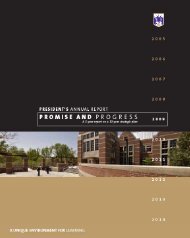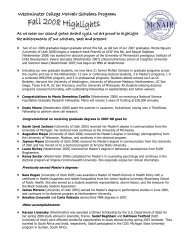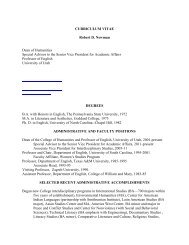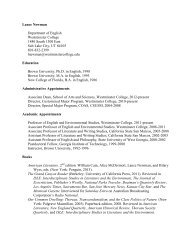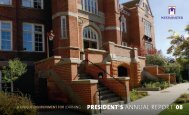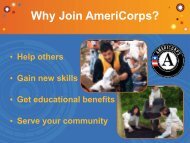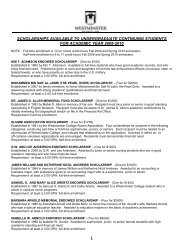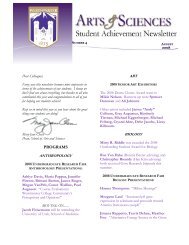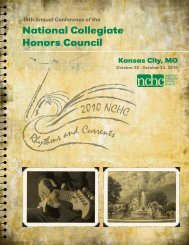Career Portfolio Tips - Westminster College
Career Portfolio Tips - Westminster College
Career Portfolio Tips - Westminster College
You also want an ePaper? Increase the reach of your titles
YUMPU automatically turns print PDFs into web optimized ePapers that Google loves.
<strong>Career</strong> <strong>Portfolio</strong> <strong>Tips</strong><br />
What is a career portfolio<br />
The Basics:<br />
1. A career portfolio is not a resume<br />
2. A career portfolio is not a cover letter<br />
3. A career portfolio is a collection of documents, please see other side for details<br />
Why use a career portfolio<br />
1. Draws attention<br />
2. Creates links<br />
3. Intangible=Tangible<br />
4. Establishes credibility<br />
5. Builds confidence<br />
Who should create a career portfolio<br />
1. Students seeking internship/ employment<br />
2. Students seeking admission to grad school<br />
What is the format of a career portfolio<br />
1. Master format: a comprehensive portfolio containing everything that could ever<br />
be applicable<br />
2. Can-do format: a tailored portfolio that is specific for the internship, position, or<br />
grad school you are applying for<br />
What are the categories of a career portfolio<br />
P.E.A.K.S:<br />
Personal characteristics<br />
Experience<br />
Accomplishments<br />
Knowledge<br />
Skills<br />
When do I use a career portfolio<br />
During an interview<br />
Hot <strong>Tips</strong>:<br />
A career portfolio is usually kept in a professional, zip-up binder<br />
Never use original documents in the binder<br />
Use sleeves, instead of 3-hole punch<br />
Use color<br />
Use pictures<br />
Don’t be afraid to ask for documents
So, what types of things go in a portfolio Here are the basic categories:<br />
<strong>Career</strong> Summary and Goals: A description of what you stand for (such as work ethic, organizational<br />
interests, management philosophy, etc.) and where you see yourself in two to<br />
five years.<br />
Professional Philosophy/ Mission Statement: A short description of the guiding principles<br />
that drive you and give you purpose.<br />
Traditional Resume: A summary of your education, achievements and work experience,<br />
using a chronological or functional format.<br />
Scannable/ Text-Base Resume: A text-only version of your resume should be included.<br />
Skills, Abilities and Marketable Qualities: A detailed examination of your skills and experience.<br />
This section should include the name of the skill area; the performance or behavior,<br />
knowledge, or personal traits that contribute to your success in that skill area; your<br />
background and specific experiences that demonstrate your application of the skill.<br />
List of Accomplishments: A detailed listing that highlights the major accomplishments in<br />
your career to date. Accomplishments are one of the most important elements of any good<br />
job-search.<br />
Samples of Your Work: A sampling of your best work, including reports, papers, studies,<br />
brochures, projects, presentations, etc. Besides print samples, you can also include CD-<br />
ROMs, videos, and other multimedia formats.<br />
Research, Publications, Reports: A way to showcase multiple skills, including your written<br />
communications abilities. Include any published papers and conference proceedings.<br />
Testimonials and Letters of Recommendations: A collection of any kudos you have received<br />
from customers, clients, colleagues, past employers, professors, etc. Some experts<br />
even suggest including copies of favorable evaluations and reviews.<br />
Awards and Honors: A collection of any certificates of awards, honors, scholarships.<br />
Conference and Workshops: A list of conferences, seminars, and workshops you’ve participated<br />
in and/or attended.<br />
Transcripts, Degrees, License, and Certifications: A description of relevant courses,<br />
degrees, licenses, and certifications.<br />
Professional Development Activities: A listing of professional associations and conferences<br />
attended- and any other professional development activities.<br />
Military Records, Awards, and Badges: A listing of your military services, if applicable.<br />
Volunteering/Community Service: A description of any community service activities, volunteer<br />
or pro bono work you have completed, especially as it relates to your career.<br />
References List: A list of three to five people (including full names, titles, addresses, and<br />
phone/email) who are willing to speak about your strengths, abilities, and experiences. At<br />
least one reference should be a former manager.<br />
The key to remember as you contemplate these items is that you want to give reasons for<br />
the employer to hire you- you want to showcase your education and work experience by<br />
showing examples and evidence of your work, skills, and accomplishments.


